Table of Contents
Would you like to improve your nutrition and enrich your diet with some superfoods? In that case, chia seeds might be the right choice! They contain a decent amount of healthy fats, fibre and other beneficial nutrients, boasting numerous health benefits. Their great advantage is that they can be easily incorporated into your diet. Let’s explore how chia seeds can help enhance your health.
The article will cover the impact of chia seeds on these areas:
What Are Chia Seeds?
Chia seeds are tiny seeds of the plant called Salvia hispanica, originating from Mexico and northern Guatemala. However, they are not a novelty; quite the opposite. They were cultivated by ancient Aztecs and Mayans, who offered them to their gods during religious ceremonies and rituals. Besides that, they were used as food in cosmetics and traditional medicine. In fact, “chia” is an ancient Mayan word meaning strength. [1]
You’ve probably encountered chia seeds before. They are small, flat seeds with an oval shape and a glossy texture. There are several types distinguished by their color. The most common are black or dark brown, originating from the aforementioned Salvia hispanica. From the same plant come white chia seeds. Apart from these, there are also golden chia seeds, originating from Salvia columbariae.
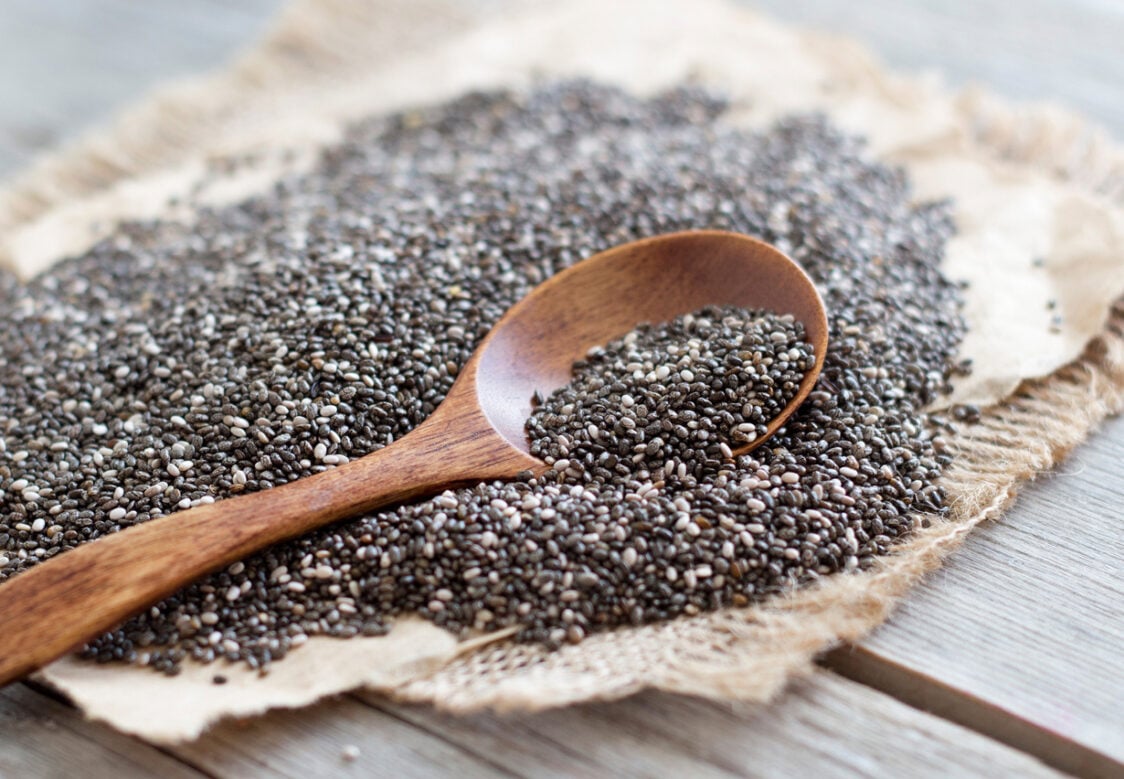
Chia seeds are highly popular today and are often referred to as a superfood due to the benefits they can have on the human body. They are rich in various nutrients, such as omega-3 fatty acids, fibre, and other biologically active compounds, which give them unique properties for our health.
You might be interested in these products:
What Effects Do Chia Seeds Have on Health?
1. Cardiovascular Health Support
Chia seeds may help reduce the risk of cardiovascular diseases. They boast a decent amount of omega-3 fatty acids, which are among the best fats for heart health. This is mainly due to alpha-linolenic acid (ALA), which is associated with anti-inflammatory effects and reducing LDL (bad) cholesterol. [2]
Omega-3 fatty acids are also associated with lowering triglyceride levels, which is equally important for maintaining heart health. Elevated triglyceride levels are associated with a higher risk of developing cardiovascular problems. Additionally, these fatty acids also have a favourable impact on lowering blood pressure. Studies also point to their anti-thrombotic effects, i.e. the ability to reduce blood clotting and prevent the formation of blood clots. They also help prevent arteriosclerosis (hardening of the arteries), which can lead to conditions such as heart attacks or strokes. Omega-3 fatty acids may also be beneficial in cases of arrhythmia. [3]
- If you would like to learn more about Omega-3 fatty acids, you should definitely check out our article Omega-3 Fatty Acids: What Impact Do They Have on the Brain, Heart, Eyes, or Muscles, and How to Take Them?
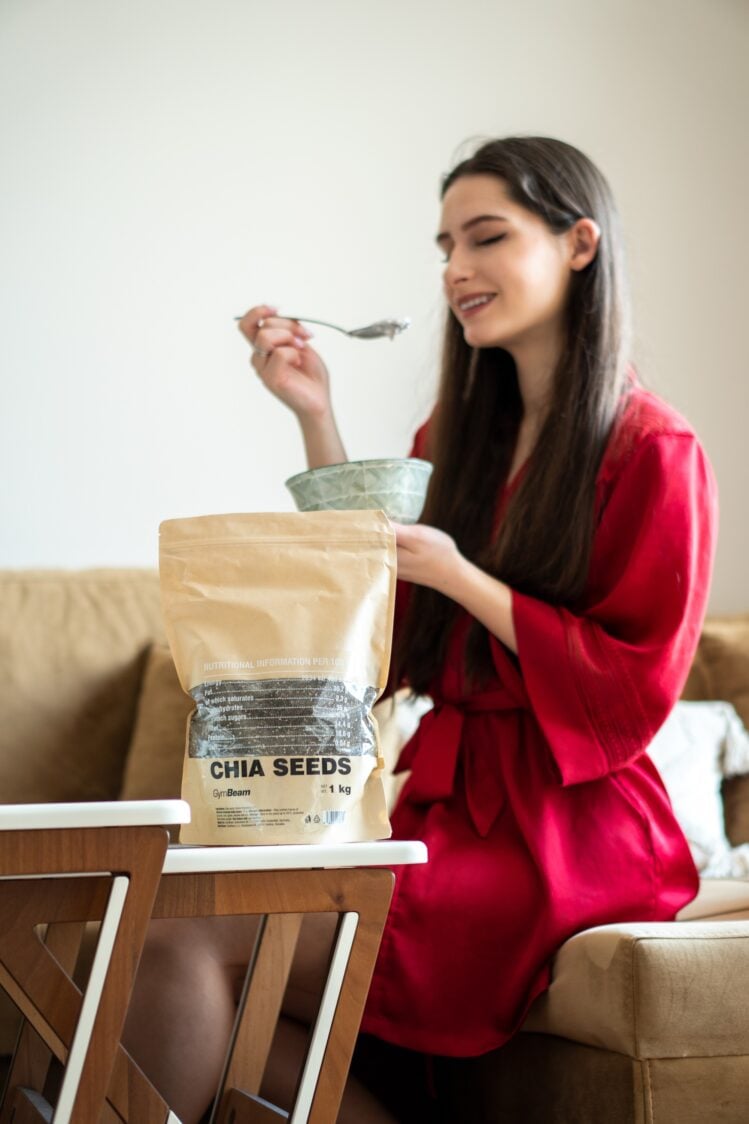
2. Blood Sugar Levels Regulation
Chia seeds are an excellent source of fibre, high-quality protein and complex carbohydrates, helping regulate blood sugar levels. Fibre slows down and prolongs the process of sugar absorption, thanks to which the addition of chia seeds to meals can reduce fluctuations in blood sugar (glycemia). In the long term, consuming chia seeds may also be beneficial in reducing insulin resistance.[4,5]
These benefits of chia seeds can help prevent the onset of metabolic syndrome or type 2 diabetes. Studies have even found that bread made with chia seeds has a lower glycemic index and impacts blood sugar levels less than traditional wheat bread. [4,5]
3. Microbiome Health Benefits
Thanks to fibre (chia seeds contain both soluble and insoluble fibre), they act as a prebiotic, promoting the activity and growth of beneficial gut bacteria. These are known as the microbiome or gut microbiota. The condition of these billions of colonizers is important for the body because they contribute to healthy digestion and participate in processes related to the immune system.
4. Bone Health Support
Chia seeds contain minerals such as phosphorus, calcium, magnesium and potassium, which play an important role in maintaining bone health. For example, calcium has many important functions in the body, mainly related to the health of bones and teeth.
Long-term calcium deficiency can lead to osteoporosis and increased risk of fractures. Strong bones are important throughout life, especially in old age, when lower bone quality can increase the risk of fractures from falls. Incorporating chia seeds into your diet can thus help with bone health care.[6]
5. Help with Fighting Free Radicals and Reducing Inflammation
Chia seeds are a source of many antioxidants that protect body’s cells from free radicals. They contain, for example, quercetin, which has the ability to fight inflammation and protect cells from oxidative stress. Oxidative stress occurs when the balance between the amount of free radicals and the body’s ability to neutralize them is disrupted. [7 – 8]
Free radicals can then attack and damage cells. Oxidative stress may contribute to the development of several diseases, such as diabetes, atherosclerosis (hardening of the arteries), inflammatory conditions, high blood pressure, or neurodegenerative diseases such as Parkinson’s or Alzheimer’s disease. The role of antioxidants is to fight oxidative stress by capturing free radicals and removing them. [7 – 8]
Interestingly, foods that are rich in quercetin have long been in the spotlight of scientists, for example when investigating their potential to slow down and delay the ageing process. [6]
Nutritional Values of Chia Seeds
Average energy and nutrient content in chia seeds
Chia seeds are valued for their rich nutritional profile. They are a source of healthy fats, amino acids, fibre, and minerals.
Nutritional Values | |
|---|---|
| Energy Value | 486 kcal |
| Fats | 30.7 g |
| – Monounsaturated Fatty Acids | 2.3 g |
| – Polyunsaturated Fatty Acids | 23.7 g |
| Carbohydrates | 7.7 g |
| Fibre | 34.4 g |
| Protein | 16.5 g |
Macro-Nutrients in Chia Seeds
1. Carbohydrates
Chia seeds contain a relatively low amount of this macronutrient. They consist mainly of complex carbohydrates, which are carbohydrates composed of long chains of simple sugars, including starches, also known as polysaccharides, cellulose and fibre. Chia seeds are rich in fibre with up to 80% of the carbohydrates they contain being in the form of fibre, both soluble and insoluble. [10]
2. Fats
Chia seeds contain monounsaturated and polyunsaturated fatty acids, which are considered healthy fats. A unique property of chia seeds is their high content of one of the omega-3 fatty acids, alpha-linolenic acid (ALA). From this, eicosapentaenoic acid (EPA) and docosahexaenoic acid (DHA) are formed in the body, which are necessary for the proper functioning of the brain, heart, and vision.
3. Protein
Chia seeds also contain a significant amount of protein. It is noteworthy that they contain all 9 essential amino acids in a quite favourable ratio. They have a relatively beneficial amino acid spectrum, thanks to which they are a high-quality and complete source of plant-based protein, meaning that they certainly come in handy in the diet of any vegan. [11]
Micro-Nutrients in Chia Seeds
Chia seeds are rich in several minerals, with particularly high levels of phosphorus, magnesium, potassium, calcium, manganese and selenium.[9, 10]
Phosphorus contributes to the health of bones and tissues. Magnesium is a mineral that the body necessarily needs for basic functions and maintaining optimal health. It plays an important role in the proper functioning of the nervous system and muscles. Magnesium deficiency can manifest as increased fatigue, mood changes, impaired ability to concentrate or muscle cramps. Potassium is essential for many processes in the body, including the proper function of the nervous system, muscles, and kidneys. Calcium, on the other hand, is essential for bones and muscles. Manganese is involved in energy metabolism and immune function, while selenium is essential for the production of thyroid hormones and regulation of inflammatory processes in the body. [12, 13, 19]
Chia seeds also contain iron and zinc, but the body might absorb them less efficiently due to the presence of phytic acid. [14 – 17]
Chia seeds are also a rich source of polyphenols, i.e. antioxidants. They contain, for example, the aforementioned quercetin, but also rutin, chlorogenic acid and caffeic acid, which fight free radicals in the body. [10]
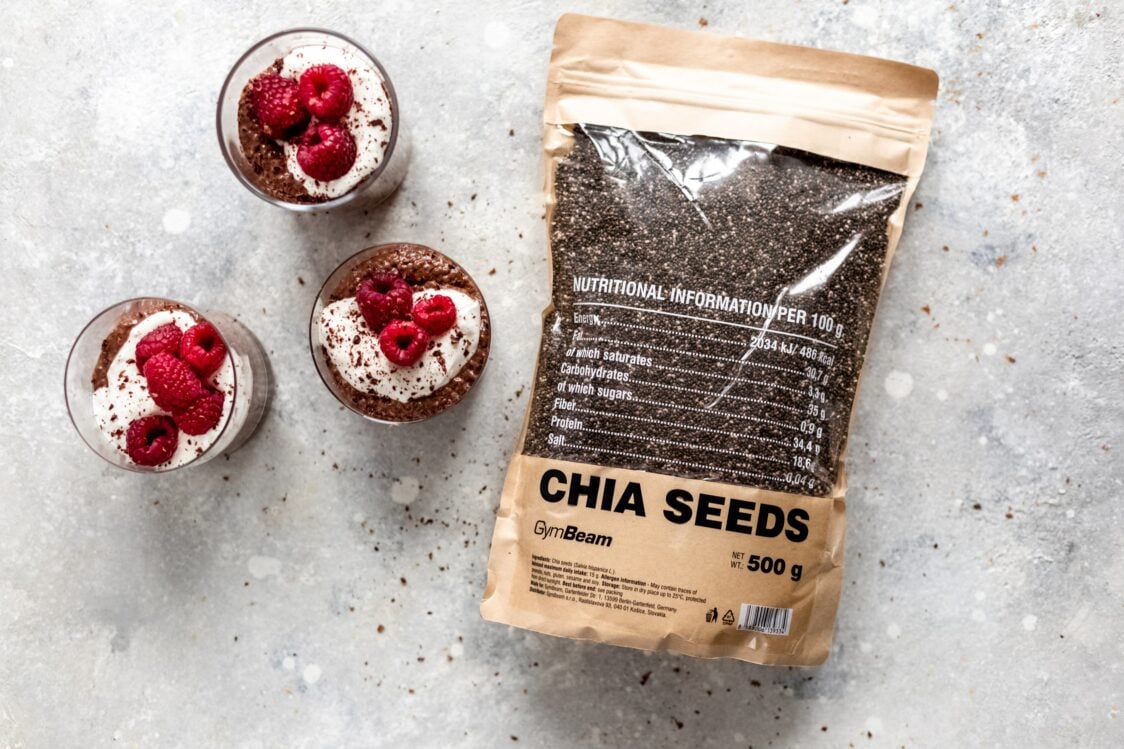
Chia Seeds and Weight Loss
You may have heard claims that chia seeds help with weight loss. This claim is somewhat true, but also not. It’s more about the fact that chia seeds have a high fibre content and the ability to absorb water. You may have noticed this when you put chia seeds in water or milk and observed how they swelled. A similar process occurs in the body. When consumed, they increase the volume of ingested food in the digestive tract, which can lead to prolonged feelings of fullness and reduced food intake. This way, chia seeds can help prevent overeating.
However, there are no studies in the scientific community that explicitly confirm the direct effect of chia seeds on weight loss. Moreover, these seeds contain a relatively high amount of fat and are therefore also calorically dense.
In conclusion, if the intake of chia seeds is moderate and incorporated into a varied diet that respects a caloric deficit, they can support weight loss due to their fibre content and increased feeling of fullness. Conversely, if you eat too many chia seeds, you may increase your calorie intake, which will not be beneficial for weight loss.
Discover our bestsellers:
Could Chia Seeds Have Side Effects?
When consumed in moderation, chia seeds are safe and not associated with any adverse effects.
However, as mentioned, chia seeds contain a high proportion of fibre. While fibre is essential for human health as it supports the health of the digestive tract, consuming it in excess can lead to problems for some people. These issues may arise, especially when there is a sudden increase in fibre intake, to which the body is not accustomed. Excessive fibre intake can cause stomach pain, diarrhea, bloating, or flatulence.[18]
These problems can also occur when high fibre intake is accompanied with inadequate hydration. Water is necessary to help fibre move through the digestive tract. Most of these problems can be avoided by increasing the fibre intake gradually while maintaining adequate fluid intake. [18]
Like all seeds, chia seeds contain phytic acid. This is a plant compound that binds to certain minerals such as zinc or iron and inhibits their absorption from food. This means that it can worsen the absorption of these minerals.[17]
Another risk of consuming chia seeds may be an allergic reaction, although this is generally rare.
Chia seeds contain many beneficial nutrients and boast several health benefits, making them a great addition to most people’s diets. The key is to consume them in moderation. However, if you have any health concerns or are unsure, it is advisable to consult your healthcare provider before starting to consume chia seeds.
How to Store Chia Seeds?
Proper storage is important for maintaining the freshness and quality of chia seeds. To preserve the beneficial properties of this popular superfood, it is ideal to store it in an airtight container in a dark and cool place. Exposure to moisture, air, heat, or direct sunlight could deteriorate their quality and nutritional value.
Chia seeds have the ability to retain moisture, so store them in a dry place. They can also absorb various scents and odors, so it’s better to store them away from aromatic spices or cleaning agents.
- Interested in learning how to properly store not only chia seeds but also other foods? We have written a whole article on this topic! Read more about How to Properly Store Foods to Keep Them Fresh For as Long as Possible.
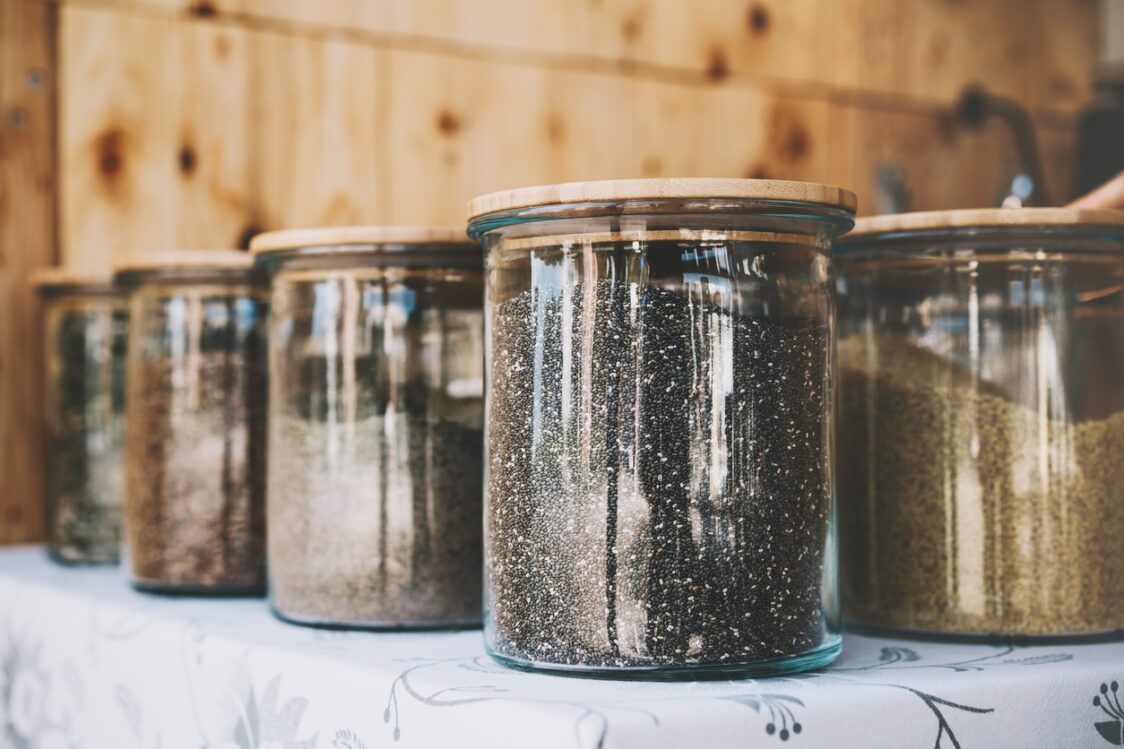
How to Incorporate Chia Seeds into Your Diet?
If you’re new to consuming chia seeds, start slowly to give your body time to adjust. Also, make sure you have an adequate intake of water. It’s better to let the seeds swell before consumption to maximize their properties. Unlike flax seeds, chia seeds do not need to be ground before consumption.
There are various ways to incorporate chia seeds into your diet. They are suitable for preparing both sweet and savoury treats. Moreover, they are naturally gluten-free, making them a suitable food for a gluten-free diet, for example, due to celiac disease.
You can use them to prepare chia pudding, which is great for breakfast or as a sweet treat after lunch. Chia pudding can be prepared in many different ways. The base involves soaking chia seeds in plant-based or regular milk. Combine 4 tablespoons of chia seeds with one cup of milk, add sweetener of your choice, and let the chia rest in the refrigerator for a few hours, ideally overnight. The seeds will swell beautifully and create a pudding-like consistency. Then you can flavour the pudding with fresh or dried fruits, sweet syrups or nuts.
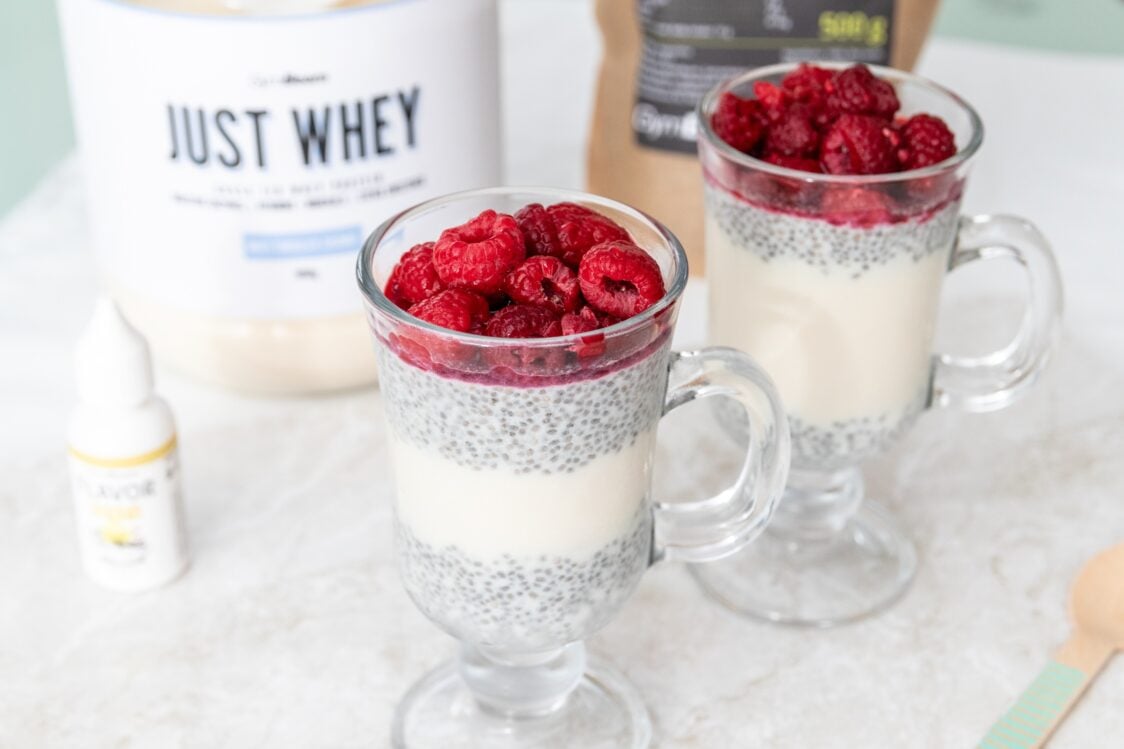
Chia seeds are also very popular among vegans or people who prefer plant-based alternatives, because they can be used as an egg substitute in baked recipes. To replace one egg, you can mix one to two tablespoons of chia seeds with at least three tablespoons of water. Let them sit for 10 to 15 minutes until they form a gel-like substance. You can then use this mixture in the recipe instead of eggs.
You can also prepare quick homemade chia jam which will go great with pancakes, for example. Simmer the fruit in a saucepan until it softens and releases juice. Then add sweetener of your choice and chia seeds. Let it sit until the jam thickens.
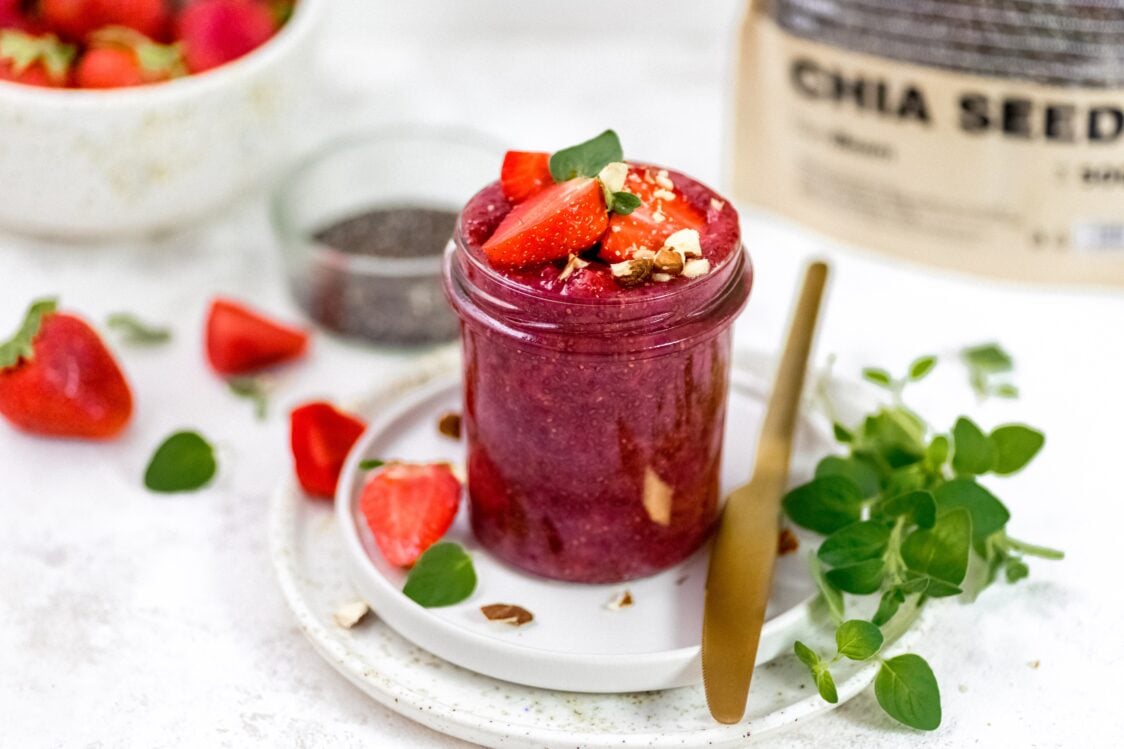
Chia seeds can also be sprouted, and chia sprouts can serve as a source of nutritious elements for your salads or as a garnish for dishes.
Moreover, you can incorporate chia seeds into your diet by adding them to yoghurts, porridges, or cereals. You can also add them to baking, for example when making homemade bread, cookies, muffins, or other sweet desserts. You can prepare quick energy balls by blending swelled up chia seeds with dates, cocoa, and oatmeal.
But the use of chia seeds doesn’t end there. Here are some more tips on how to incorporate chia seeds into your diet:
- In water, tea or juice,
- In homemade lemonades,
- In smoothies,
- In homemade granola,
- In scrambled eggs,
- As a crunchy topping for meat or fish,
- In pizza dough
- In salad dressings,
- In soups and sauces for thickening,
- In homemade protein bars,
- In pancakes or waffles.
Best Recipes with Chia Seeds
As you can see, chia seeds can be used in many ways. Basically, the sky is the limit and you can let your creativity go wild. We have prepared several recipes for your inspiration and to help you incorporate this superfood into your diet more easily.
- Chia Tiramisu Pudding
- Protein Chia Pudding with Chocolate Flavour
- Coconut Chia Pudding with Banana
- Sweet Bulgur with Banana and Cocoa Flavour
- Quick Banana Chia Pudding with Almond Milk
- Homemade Strawberry Jam with Chia Seeds
- Quark Chia Pudding with Fruit
- Vegan Protein Cookies with Chia Seeds
- Protein Pudding with Chia Seeds and Raspberries
- If these recipes are not enough for you, you can get inspired by another 23 Recipes for Delicious Chia Puddings that we have prepared for you.
- If you want to learn more about the different types of seeds, you should not miss our article Which Seeds Are the Most Nutritious and What Health Benefits Do They Have?
What should you remember?
Chia seeds are a superfood packed with many beneficial nutrients. Optimal consumption of chia seeds can help increase intake of healthy fats, fibre, minerals and antioxidants, which can reflect on improving many functions in the body. Chia seeds can help regulate blood sugar levels, support cardiovascular health, improve digestion, or lower LDL cholesterol levels. They can also aid in weight loss because their fibre content prolongs the feeling of fullness, preventing overeating. However, it is essential to consume them in the right amount to avoid adverse effects.
And how do you view chia seeds? Are they a regular part of your diet, or not yet? If you liked the article, support it by sharing it so that your friends can learn about the benefits of chia seeds too.
[1] MUÑOZ, L. A., COBOS, A., DIAZ, O., AGUILERA, J. M. Chia Seed (Salvia hispanica): An Ancient Grain and a New Functional Food – https://doi.org/10.1080/87559129.2013.818014
[2] SALA-VILA, A., FLEMING, J., KRIS-ETHERTON, P., ROS, E. Impact of α-Linolenic Acid, the Vegetable ω-3 Fatty Acid, on Cardiovascular Disease and Cognition – https://pubmed.ncbi.nlm.nih.gov/35170723/
[3] MOZAFFARIAN, D., WU, J. H.Y. Omega-3 Fatty Acids and Cardiovascular Disease: Effects on Risk Factors, Molecular Pathways, and Clinical Events – https://www.sciencedirect.com/science/article/pii/S0735109711031317
[4] VUKSAN, V., JENKINS, A.L., DIAS, A.G., LEE, A.S., JOVANOVSKI, E., ROGOVIK, A.L., HANNA, A. Reduction in postprandial glucose excursion and prolongation of satiety: possible explanation of the long-term effects of whole grain Salba (Salvia Hispanica L.) – https://pubmed.ncbi.nlm.nih.gov/20087375/
[5] HO, H., LEE, A.S., JOVANOVSKI, E., JENKINS, A.L., DESOUZA, R., VUKSAN, V. Effect of whole and ground Salba seeds (Salvia Hispanica L.) on postprandial glycemia in healthy volunteers: a randomized controlled, dose-response trial – https://pubmed.ncbi.nlm.nih.gov/23778782/
[6] BORST, H. 6 Health Benefits Of Chia Seeds, According To Science – https://www.forbes.com/health/nutrition/chia-seeds-benefits/
[7] MARTÍNEZ-CRUZ, O., PAREDES-LÓPEZ, O. Phytochemical profile and nutraceutical potential of chia seeds (Salvia hispanica L.) by ultra high performance liquid chromatography – https://pubmed.ncbi.nlm.nih.gov/24811150/
[8] PIZZINO, G., IRRERA, N., CUCINOTTA, M., PALLIO, G., MANNINO, F., ARCORAC,I V., SQUADRITO, F., ALTAVILLA, D., BITTO, A. Oxidative Stress: Harms and Benefits for Human Health – https://www.ncbi.nlm.nih.gov/pmc/articles/PMC5551541/
[9] Food Data Central – https://fdc.nal.usda.gov/fdc-app.html#/food-details/170554/nutrients
[10] KULCZYŃSKI, B., KOBUS-CISOWSKA, J., TACZANOWSKI, M., KMIECIK, D., GRAMZA-MICHAŁOWSKA, A. The Chemical Composition and Nutritional Value of Chia Seeds-Current State of Knowledge – https://www.ncbi.nlm.nih.gov/pmc/articles/PMC6627181/#B24-nutrients-11-01242
[11] SANDOVAL-OLIVEROS, M. R., PAREDES-LÓPEZ, O. Isolation and Characterization of Proteins from Chia Seeds (Salvia hispanica L.) – https://pubs.acs.org/doi/abs/10.1021/jf3034978
[12] Selenium – https://ods.od.nih.gov/factsheets/Selenium-HealthProfessional/
[13] Manganese – https://ods.od.nih.gov/factsheets/Manganese-HealthProfessional/
[14] TAKEDA, E., YAMAMOTO, H., YAMANAKA-OKUMURA, H., TAKETANI, Y. Dietary phosphorus in bone health and quality of life – https://pubmed.ncbi.nlm.nih.gov/22646125/
[15] ALLEN, K.G., KLEVAY, L.M. Copper: an antioxidant nutrient for cardiovascular health – https://pubmed.ncbi.nlm.nih.gov/15559027/
[16] EMKEY, R.D, EMKEY, G.R. Calcium metabolism and correcting calcium deficiencies – https://pubmed.ncbi.nlm.nih.gov/22877428/
[17] SCHLEMMER, U., FRØLICH, W., PRIETO, R.M, GRASES, F. Phytate in foods and significance for humans: food sources, intake, processing, bioavailability, protective role and analysis – https://pubmed.ncbi.nlm.nih.gov/19774556/
[18] Dietary Fiber – https://www.ncbi.nlm.nih.gov/books/NBK218764/
[19] Potassium – https://ods.od.nih.gov/factsheets/Potassium-HealthProfessional/

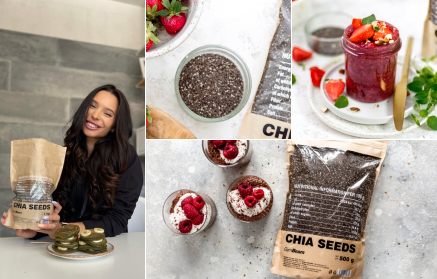
Add a comment